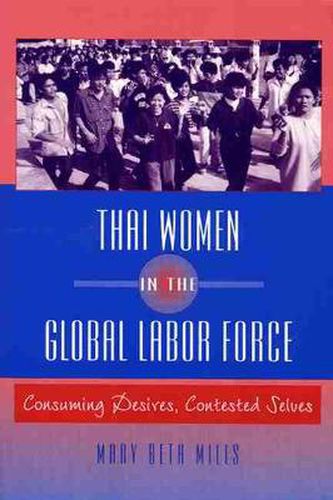Readings Newsletter
Become a Readings Member to make your shopping experience even easier.
Sign in or sign up for free!
You’re not far away from qualifying for FREE standard shipping within Australia
You’ve qualified for FREE standard shipping within Australia
The cart is loading…






Most research on female labor migration in Thailand focuses on that country’s infamous sex industry. Mary Beth Mills offers the first extended ethnographic analysis of rural women’s movement into less visible occupations, paying particular attention to the hundreds of thousands of young women who fill the factories and sweatshops of the Bangkok metropolis. Mills follows the women as they travel from the village of Baan Naa Sakae to Bangkok, where they encounter new forms of consumption, new
modern
lifestyles, and a new sense of identity. She finds this rural-urban migration is more than a simple economic activity, but rather an elaborate process of cultural change. Mills describes the environments from which these women left, as well as the urban landscape they now call home. Hence, she examines key aspects of rural Thai community life, such as local consumption practices, gender roles, and the familial tensions that are often the catalyst to labor migration. Then she focuses on the city and the underlying tensions of urban employment as migrants pursue newly imagined identities as modern women, while still upholding economic and moral responsibilities to rural kin.
$9.00 standard shipping within Australia
FREE standard shipping within Australia for orders over $100.00
Express & International shipping calculated at checkout
Stock availability can be subject to change without notice. We recommend calling the shop or contacting our online team to check availability of low stock items. Please see our Shopping Online page for more details.
Most research on female labor migration in Thailand focuses on that country’s infamous sex industry. Mary Beth Mills offers the first extended ethnographic analysis of rural women’s movement into less visible occupations, paying particular attention to the hundreds of thousands of young women who fill the factories and sweatshops of the Bangkok metropolis. Mills follows the women as they travel from the village of Baan Naa Sakae to Bangkok, where they encounter new forms of consumption, new
modern
lifestyles, and a new sense of identity. She finds this rural-urban migration is more than a simple economic activity, but rather an elaborate process of cultural change. Mills describes the environments from which these women left, as well as the urban landscape they now call home. Hence, she examines key aspects of rural Thai community life, such as local consumption practices, gender roles, and the familial tensions that are often the catalyst to labor migration. Then she focuses on the city and the underlying tensions of urban employment as migrants pursue newly imagined identities as modern women, while still upholding economic and moral responsibilities to rural kin.